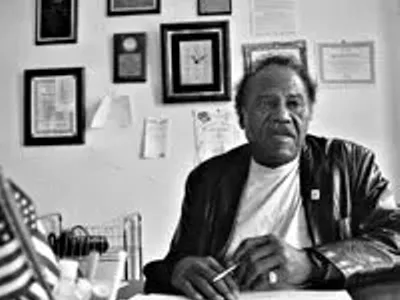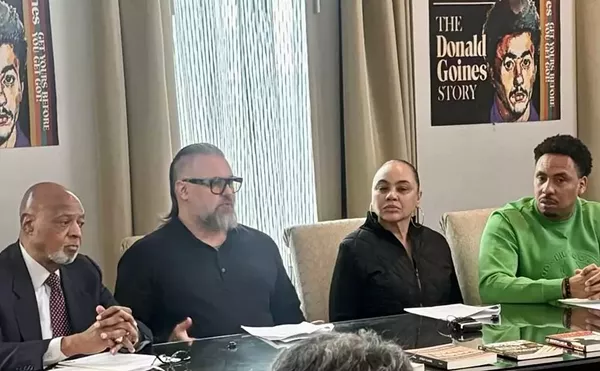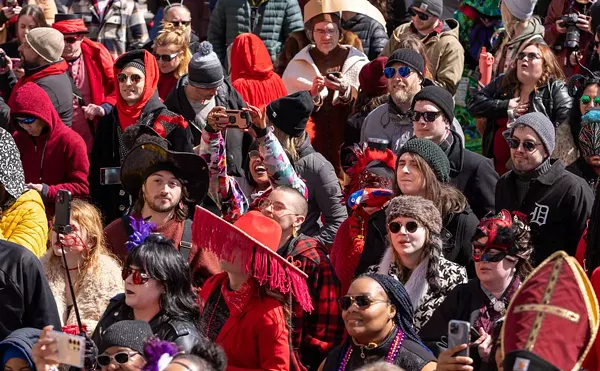Jose De Jesus Lopez is the face of Mexicantown. The 12th child of a Mexican farmer, Lopez came to Detroit in the early 1980s when he was 17 and labored in butcheries, restaurants and construction sites. In the burned-out, crime-ridden area near Dix and Vernor, Lopez bought his house for $10,000 cash in 1991. He didn’t have credit then, but paid his taxes and his bills, all while fixing up his home, tending the yard and beautifying the structure.
He sold his house for $53,000 in 1999 and opened a taqueria on a messy industrial lot on Dix. He fought through a confusing web of city bureaucracy and what he calls horrible treatment of Spanish-speakers to expand his restaurant.
“Just because you don’t speak the language does not mean you are a vegetable,” says Lopez. “You could be a genius.”
Now, Lopez is the proud owner of Mi Pueblo Taqueria, a spotless, full-service restaurant that boasts a line out the door on weekends. In three years, he’s expanded three times.
Thousands like Lopez have migrated to Mexicantown since the 1970s from the Mexican state of Jalisco, where producing tequila is the main industry and “you can work all day and not make much profit,” says Lopez. In Detroit, the immigrants work hard, save money and buy homes with cash.
Now, Mexicantown is thriving. Streets from Clark Park to the edge of Detroit at Patton Park are seeing new construction and homes are being renovated. Driving down Vernor, evidence of the bustling neighborhood is everywhere. Taquerias, mercados, Mexican bakeries and watering holes pepper the streets. Most of the taqueria owners are related — cousins, sisters and brothers — and the menus are nearly identical, serving beef brains and tongue and other Mexican treats.
Locals call Mexicantown “Little Jalisco” because so many people hail from there. The neighborhood is a hodgepodge, with dilapidated homes next to rows of immaculately tended yards. Brick Victorians front Clark Park; apartments sprawl above the business district on Vernor. Up and down the residential streets, run-down houses abut modest and impressive two-story brick and wood homes with little yards. The homes are gaining value rapidly. Lawnmowers can be heard on every street; men hoisting beams to fix roofs and renovate facades are everywhere.
Lopez is proud of his home on Clippert Street, with its added columns and improved yard and driveway. Someone recently offered him $75,000 for the home he bought for $19,000 seven years ago, he says.
“Good things are happening,” says Lopez. “When I came here, houses were burning. It wasn’t safe. For every five houses, there was one burnt. Homeless people lived there. Now, it’s really nice.”
Most of his family lives here, says Lopez, and he and the others are living the American fantasy.
“This is our dream. This is why we came,” says Lopez.
On Sundays, Clark and Patton parks are jammed with thousands of residents who flock to watch soccer and baseball from dawn to dusk. Mouthwatering scents billow from tents, grills and stands selling Mexican appetizers. Men push carts selling authentic Mexican ice treats; moms push babies in strollers. Teens drive bumper-to-bumper down Vernor, blasting Latin music, whistling at ladies walking down the street. The place is alive.
Sgt. Dan Pauley from Mexicantown’s 3rd Precinct claims the area “is the safest in Detroit.”
“Stores down there don’t have bulletproof glass,” says Pauley, who grew up in Mexicantown. “It’s a real family-oriented area.”
Mexicantown used to be mainly Irish, an extension of Corktown. Now, about one of three residents is of Mexican descent, says Mary Barela of Mayor Kwame Kilpatrick’s volunteer office, who worked 28 years in Mexicantown’s neighborhood city hall.
The neighborhood has one of the fastest-growing populations in Detroit, says Maria Elena Rodriguez, president of Mexicantown Community Development Corporation.
“Ten years ago, this area was mostly boarded up,” says Rodriguez, who grew up in Mexicantown. “The families, young families, they have stabilized the neighborhood. The housing stock, you can’t get your hands on anything anymore. Quietly, people have been coming in and purchasing homes with cash.
“Now, it’s amazing. It’s really wonderful. You feel like you’ve been dropped in Mexico City.”
To honor the Irish-Mexican connection, and the numerous intermarriages, the community will host the third annual Irish-Mexican Festival Sunday, June 9, noon-8 p.m. at Fiesta Gardens, Bagley at 21st. Admission is free. A preview fiesta happens Saturday, June 8, 7 p.m. at the Gaelic League of Detroit, 2068 Michigan Ave. Admission is $10.
Return to the introduction of this special Metro Times Summerguide 2002 neighborhood profile. Lisa M. Collins is a Metro Times staff writer. Send comments to [email protected]






